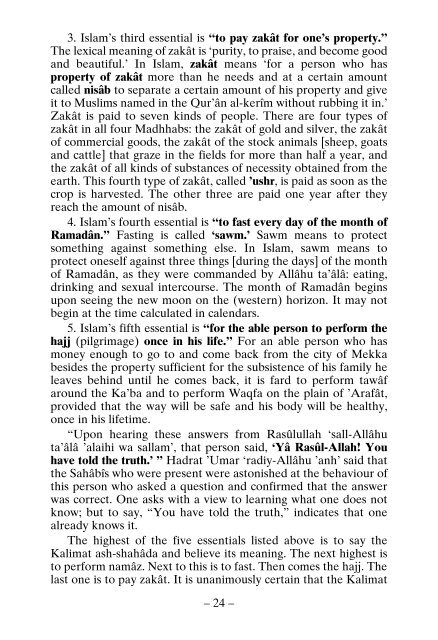Belief and Islam
BELIEF AND ISLAM star This work, Belief and Islam, originally was written in Persian under the title I’tiqâd-nâma by Hadrât Mawlânâ Khâlid al-Baghdâdî, a profound ‘âlim of Islam and a specialist in ma’ârif of tasawwuf. Hâji Faydullah Effendi of Kemah, a khalîfa of great walî Mavlânâ Mahmûd Sâhib, the brother of the author, translated the book into Turkish and named it Farâid-ul-fawâid which was printed in Istanbul in 1312 A.H.[1894]. Our bookstore had it translated again from the Persian original into Turkish and, some explanations and three chapters, published it with the title Imân ve Islâm in 1966. German, French and Arabic versions are also published by our bookstore. This book, explains five fundamentals of Islam, six fundamentals of îmân and the contemporary information about the matter and refutes those who are against Islam and those who are lâ-madbhabî.
BELIEF AND ISLAM
star This work, Belief and Islam, originally was written in Persian under the title I’tiqâd-nâma by Hadrât Mawlânâ Khâlid al-Baghdâdî, a profound ‘âlim of Islam and a specialist in ma’ârif of tasawwuf. Hâji Faydullah Effendi of Kemah, a khalîfa of great walî Mavlânâ Mahmûd Sâhib, the brother of the author, translated the book into Turkish and named it Farâid-ul-fawâid which was printed in Istanbul in 1312 A.H.[1894]. Our bookstore had it translated again from the Persian original into Turkish and, some explanations and three chapters, published it with the title Imân ve Islâm in 1966. German, French and Arabic versions are also published by our bookstore. This book, explains five fundamentals of Islam, six fundamentals of îmân and the contemporary information about the matter and refutes those who are against Islam and those who are lâ-madbhabî.
You also want an ePaper? Increase the reach of your titles
YUMPU automatically turns print PDFs into web optimized ePapers that Google loves.
3. <strong>Islam</strong>’s third essential is “to pay zakât for one’s property.”<br />
The lexical meaning of zakât is ‘purity, to praise, <strong>and</strong> become good<br />
<strong>and</strong> beautiful.’ In <strong>Islam</strong>, zakât means ‘for a person who has<br />
property of zakât more than he needs <strong>and</strong> at a certain amount<br />
called nisâb to separate a certain amount of his property <strong>and</strong> give<br />
it to Muslims named in the Qur’ân al-kerîm without rubbing it in.’<br />
Zakât is paid to seven kinds of people. There are four types of<br />
zakât in all four Madhhabs: the zakât of gold <strong>and</strong> silver, the zakât<br />
of commercial goods, the zakât of the stock animals [sheep, goats<br />
<strong>and</strong> cattle] that graze in the fields for more than half a year, <strong>and</strong><br />
the zakât of all kinds of substances of necessity obtained from the<br />
earth. This fourth type of zakât, called ’ushr, is paid as soon as the<br />
crop is harvested. The other three are paid one year after they<br />
reach the amount of nisâb.<br />
4. <strong>Islam</strong>’s fourth essential is “to fast every day of the month of<br />
Ramadân.” Fasting is called ‘sawm.’ Sawm means to protect<br />
something against something else. In <strong>Islam</strong>, sawm means to<br />
protect oneself against three things [during the days] of the month<br />
of Ramadân, as they were comm<strong>and</strong>ed by Allâhu ta’âlâ: eating,<br />
drinking <strong>and</strong> sexual intercourse. The month of Ramadân begins<br />
upon seeing the new moon on the (western) horizon. It may not<br />
begin at the time calculated in calendars.<br />
5. <strong>Islam</strong>’s fifth essential is “for the able person to perform the<br />
hajj (pilgrimage) once in his life.” For an able person who has<br />
money enough to go to <strong>and</strong> come back from the city of Mekka<br />
besides the property sufficient for the subsistence of his family he<br />
leaves behind until he comes back, it is fard to perform tawâf<br />
around the Ka’ba <strong>and</strong> to perform Waqfa on the plain of ’Arafât,<br />
provided that the way will be safe <strong>and</strong> his body will be healthy,<br />
once in his lifetime.<br />
“Upon hearing these answers from Rasûlullah ‘sall-Allâhu<br />
ta’âlâ ’alaihi wa sallam’, that person said, ‘Yâ Rasûl-Allah! You<br />
have told the truth.’ ” Hadrat ’Umar ‘radiy-Allâhu ’anh’ said that<br />
the Sahâbîs who were present were astonished at the behaviour of<br />
this person who asked a question <strong>and</strong> confirmed that the answer<br />
was correct. One asks with a view to learning what one does not<br />
know; but to say, “You have told the truth,” indicates that one<br />
already knows it.<br />
The highest of the five essentials listed above is to say the<br />
Kalimat ash-shahâda <strong>and</strong> believe its meaning. The next highest is<br />
to perform namâz. Next to this is to fast. Then comes the hajj. The<br />
last one is to pay zakât. It is unanimously certain that the Kalimat<br />
– 24 –

















